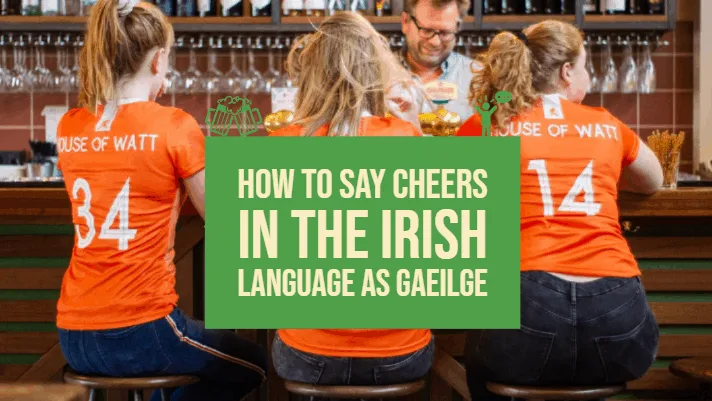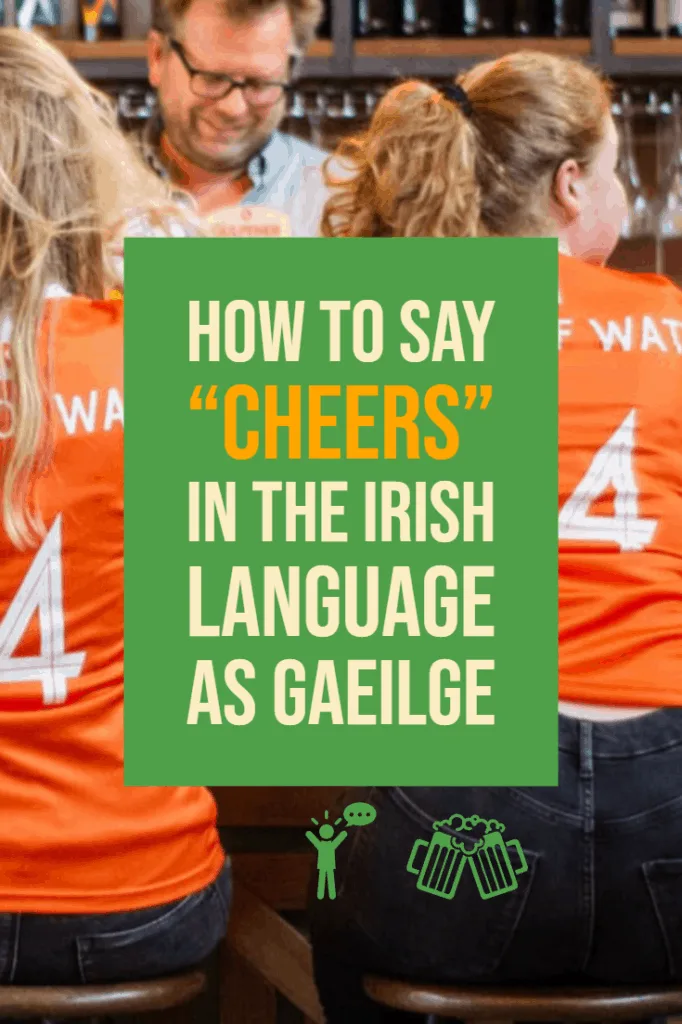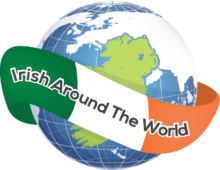You visit Ireland for the first time, stop into an Irish bar, and are wondering, “just how do I say cheers in Irish!?”.
Don’t worry; you are not the first person to Google this. How to say cheers in Irish get’s Googled over 8000 times a month in America alone!
So how do you say cheers in Irish?
While there are various ways to say cheers in Irish, the most common way to say cheers in Irish is Sláinte!
How do you pronounce “cheers in Irish”? 🍺🍺
You pronounce Sláinte like “slawwn-chee” or “Slaw-in-tche”
What does Sláinte mean in English?
While there are many variations of Sláinte, which I will go into detail below, they all generally mean: “to your health” or “good health.” The literal translation of Sláinte is “Health.”

Now, if you want to blow away an Irishman or Irish woman, then try to say this Irish saying:
Go mbeirimíd beo ar an am seo arís – “May we be alive at this same time again next year.”
- Pronounced: Guh mer-i-meedh bee-oh er an am shu areesh
Not the easiest thing to say after a few pints of Guinness, but I am sure they will appreciate it.
Other ways to say Cheers in Irish
There are a few different ways you might hear in an Irish pub or with an Irish person that you might recognise. Just don’t forget the basics: Cheers! = Sláinte! 🍺
Other variations of ways to say Cheers in Irish you might hear are:
- Sláinte mhaith (pronounced slan-cha vah) – meaning “good health.”
- Sláinte chugat (pronounced hoo-uv) – meaning “health to you.”
You can also try and say: sláinte is táinte (“slawn-che iss toin-che”), meaning “health and wealth”. “Cheers” is one of the words included in lesson 10 of our course.
How to say “Cheers” and “I love you” in Irish:
The video below can give you some great context into just how to pronounce “Cheers in Irish”.
Some Irish expressions included in this video are:
- Sláinte! – cheers (Sláinte also means “health”)
- Lá breithe sona duit – happy birthday
- ádh mór ort – good luck (This means “big luck on you”)
- Nollaig shona duit – Happy Christmas
- Tá mé i ngrá leat – I’m in love with you
And while you are here, why not learn an Irish toast:
This is a perfect toast for an Irish wedding:
- Toast: May you live, and may you wear it out
Irish: Go mairir is go gathair
Pronunciation: Guh mah-rir is guh gah-hir
How do you say happy new years in Irish:

Happy New Year in Irish: ” Go mbeire muid mbeo ar an am seo arís” Pronounced as: “go merr-ih-meedh mee-oh err on om shioh ah-reesh.”
- “Go mbeire muid mbeo ar an am seo arís” for New Year’s.
This toast is appropriate to use on New Year’s Eve and wishes for health and prolonged life.
It means basically: “may we be alive at this time next year.”
- You should pronounce this toast as go merr-ih-meedh mee-oh err on om shioh ah-reesh.
How do you say “Happy St Patrick’s Day” in Irish?
If you are visiting Ireland, one final thing you should know is how to say “Happy St Patrick’s Day” in Irish!
- Lá fhéile Pádraig sona dhuit! – Happy St Patrick’s Day to you (singular)
- Lá fhéile Pádraig sona dhaoibh! – Happy St Patrick’s Day to you (plural)
What other ways of saying Cheers in Irish do you know?
Comment below and let us know, and thank you for stopping by.

Pin Me
Don’t forget to subscribe to my weekly dose of Irish and get updates to your inbox every Friday. Subscribe here.
Stephen
P.S One last Irish toast:
Toast: May God not weaken your hand
Irish: Nár laga Dia do lámh
Pronunciation: Nar lah-ga Djee-ah dhu lawv

Kathleen Kenny
Monday 6th of July 2020
My Mother blessed herself in Gaelic and it ended with something that sounded like "augus in nish Amen." but that was very long ago.
Anna
Friday 27th of September 2019
Does anyone know what a phrase sounding like suggan buggan might mean - a relative thinks it could be to do sith saddle shaped or armchair.
Kevin Duggan
Thursday 15th of August 2019
Based on the info above, my guess is "Good heath to you this year!"
Irish Around The World
Thursday 15th of August 2019
Thanks for the comment Jack. Agus means "and. Not 100% sure about "a nish". But a good one to say is Slainte agus tainte meaning Health and Wealth! Pronounced slawn-che oggus tinn-che
Jack McNulty
Thursday 15th of August 2019
My grandfather used to say something that sounded like :Slainte, Slainte agus a nish. Any ideas what it means?